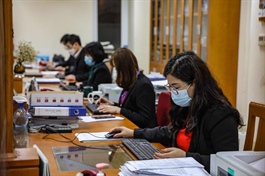Uncovering potential effects of USD’s trajectory on Vietnamese currency
Uncovering potential effects of USD’s trajectory on Vietnamese currency
A stronger US dollar is prompting a flight to safety, and investors might be looking for a safe harbour in US-denominated equities. Brook Taylor, CEO of VinaCapital Asset Management, discussed with VIR’s Luu Huong how the State Bank of Vietnam’s latest initiatives on the exchange rate could impact foreign funds into Vietnam.
The State Bank of Vietnam (SBV) last week adjusted the USD/VND exchange rate range band from +/-3 to +/-5. What is your take on this?
The 7 per cent year-to-date (YTD) depreciation in the value of VND is primarily driven by a near 20 per cent YTD surge in its value. Until two weeks ago, the exchange rate had been very resilient and VND had depreciated by less than 5 per cent – much less than the depreciations of Vietnam’s regional peers.
Over the last two weeks, some Vietnam-specific factors caused its currency to depreciate in line with its regional peers, while external factors put pressure on all emerging market currencies.
The main external factor that put additional depreciation pressure on emerging market currencies over the last two weeks was a hotter-than-expected US consumer price index inflation report that put renewed, upward pressure on USD interest rates.
The main Vietnam-specific/domestic factors that have been putting pressure on the value of VND over the last two weeks include Vietnam’s exports, which reportedly fell by more than 14 per cent month-on-month in September, which was a bigger-than-expected drop and a clear sign that exports to the US, in particular, are slowing.
In addition, the SBV injected over $5 billion worth of VND into the banking system over the last two weeks in response to the issues with privately-held SCB, which has been put under special conditions.
On the other hand, the near 20 per cent YTD surge in the value of the USD year to date was primarily driven by three factors.
First and foremost, the US Federal Reserve has been increasing interest rates much more aggressively than most other central banks in the world, which is, in turn, encouraging investment inflows to the US.
This is because the yields on US investment and the deposit rates that banks in the United States pay are getting significantly higher compared to alternative investment opportunities around the world.
Secondly, concerns about the state of the world economy, plus geopolitical concerns, prompted investors to pour money into safe-haven assets such as US Treasury bonds.
Thirdly, the value of the Euro has declined by about 13 per cent YTD because Europe (especially Germany), which typically achieved large trade surpluses in the past, is now suffering from huge and growing trade deficits because the cost of importing energy to Europe has exploded.
Other factors supporting the value of the VND include: Vietnam’s export growth has remained healthy (even if slowing), foreign investment inflows are remaining very strong and are up 16 per cent in the first nine months of 2022 to 4 per cent/GDP, and the fact that Vietnam’s public finances are in very good shape is also a plus for the currency.
Furthermore, Vietnam is one of the few countries in the world in which the government is spending less than it is tax receipts this year.
How would this decision affect foreign investors’ appetite in Vietnam, and what could be the future trend of private equity, venture capital, and other types of funds?
A surge in USD value is bad for foreign investors in emerging market countries for two reasons.
Firstly, foreign investors suffer an “FX translation” loss on the value of their investments when the USD surges, simply because they typically mainly care about the value of those investments.
Secondly, countries with a risk of major currency depreciations (for example, Turkey and Argentina) have difficulty attracting long-term capital, including private equity and venture capital investments.
Vietnam does not have this problem because the government has consistently demonstrated its resolve over the last 10 years to maintain a stable USD-VND exchange rate, and that resolve has intensified since 2015.
Therefore, I don’t think the current turbulence in the global foreign exchange market will impact such funds coming into Vietnam.
What are the challenges for Vietnam and its corporations in the context of a stronger dollar?
The main problem that an appreciation in the value of USD causes for an emerging market country is imported inflation because the prices of imported food and energy increase in local currency terms when the value of increases – which is exactly the situation the Philippines is currently facing.
However, Vietnam is self-sufficient in food and the country’s energy deficit is modest at around 3-4 per cent of GDP. This, coupled with the fact that VND deprecation is fairly modest, means that Vietnam does not have an imported inflation problem.
This helps explain why the SBV has only raised policy interest rates by 100bp this year, as compared to much larger interest rate hikes in many emerging market countries this year.
The main industries and companies worldwide that are the most impacted by dramatic changes in global exchange rates are those that do the most importing and exporting. Foreign-invested businesses account for the vast majority of Vietnam’s imports/exports, although the surge in USD value has a mixed impact on these companies.
On the one hand, the surge in the value pushes up the cost of imported production inputs; but on the other hand, a higher USD makes Vietnamese-made products cheaper for US consumers, in dollar terms.

























